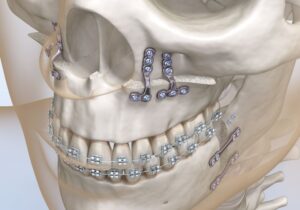
Many cases of malocclusion (a misaligned bite) can be corrected with non-invasive orthodontic treatment. But what if you are informed that you need jaw surgery to completely correct your bite? Admittedly, the prospect can seem a little intimidating! What can you expect during the journey in front of you? This blog post provides some helpful information. Hopefully, it will make you feel more confident about moving forward with treatment.
Corrective Jaw Surgery: A Basic Overview
Here are a few important notes about corrective jaw surgery, which is also known as orthognathic surgery:
- There are different types of corrective jaw surgery. When you consult with your surgeon, you can learn more about the details of your unique procedure.
- You might need braces. Very often, oral surgeons coordinate with orthodontists. Many patients need to wear braces both before and after their surgery.
- Patience is important. From the time you start wearing braces to the time your malocclusion is completely corrected, it may be several months or longer.
The Surgical Process
While the idea of undergoing surgery can seem a bit intimidating, there is really nothing to worry about. Here is a generalized overview of the surgical process:
- Your surgical team will make you comfortable. Sedation and anesthesia can allow you to feel little to nothing during your procedure.
- Your jaw will be treated. This may involve strategically cutting the bone, repositioning it, and securing it with titanium screws and plates.
- You will go through a recovery period. Some patients need to stay in the hospital for a few days after their surgery. Total recovery can take up to 6 – 12 weeks, though most people can return to many normal activities within 4 weeks or so. In the meantime, you should get plenty of rest and adhere to all post-op instructions (for example, you might need to be on a liquid diet for a while).
Is Corrective Jaw Surgery Worth It?
Corrective jaw surgery can be a major undertaking, but most patients have no regrets about committing to it! Here are some benefits that you may experience:
- A more pleasing facial profile and more confidence in your appearance.
- Improved ability to speak, bite, and chew without pain or discomfort.
- Reduction or elimination of TMJ disorder symptoms.
- Reduced risk of oral health problems.
- Improved nighttime breathing. (Corrective jaw surgery is sometimes used to treat severe cases of obstructive sleep apnea.)
- A reduction in the frequency and severity of migraines and headaches.
If your medical team recommends that you undergo corrective jaw surgery, there is no need to be afraid! Ask lots of questions so you can move forward with confidence.
Meet the Practice
Piney Point Oral & Maxillofacial Surgery of Katy/Cypress is home to two highly skilled, board-certified oral surgeons. Our team offers top-quality services, including corrective jaw surgery. If you believe you need this procedure, we will be happy to consult with you and discuss the details of your treatment plan. To learn more about how we may be able to assist you, contact our office at 832-353-1100.

